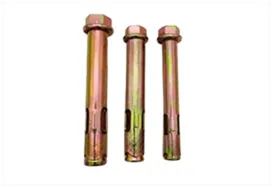Nov . 30, 2024 09:46 Back to list
different types of foundation bolts
Different Types of Foundation Bolts
Foundation bolts are essential components in construction, primarily used to secure structures to their foundation. They are vital in ensuring the stability and integrity of various types of buildings and infrastructure projects. Understanding the different types of foundation bolts and their specific applications is crucial for engineers, architects, and construction professionals.
1. Anchor Bolts
One of the most common types of foundation bolts is the anchor bolt. Anchor bolts are specifically designed to connect the structural framework of a building to its foundation, providing stability and strength. There are two main types of anchor bolts cast-in-place and post-installed.
- Cast-in-Place Anchor Bolts are embedded in the concrete foundation during the pouring process. They are typically L-shaped or J-shaped, where one end is embedded into the concrete while the other extends outward to connect to the structure.
- Post-Installed Anchor Bolts are inserted into pre-existing concrete after it has hardened. These bolts require drilling into the concrete and inserting an expansion mechanism to secure them in place. This type offers flexibility for retrofitting projects.
2. Hold Down Bolts
Hold down bolts, as the name implies, are designed to resist uplift forces, ensuring that buildings remain anchored to their foundations during extreme weather conditions or seismic activities. These bolts are typically used in wooden structures, particularly in areas prone to high winds or earthquakes. They are usually larger and thicker than standard bolts to accommodate the significant forces they must endure. Hold down bolts are commonly paired with brackets and plates to enhance their holding capacity.
3. Shear Bolts
Shear bolts are used in applications where lateral forces are a common concern. The primary function of shear bolts is to transfer shear loads between structural elements. These bolts can often be found in the connections of steel frames, bridges, and other structures that experience significant shearing forces. Shear bolts are designed to fail at a predetermined force level, which is a safety feature that prevents larger structural failures.
different types of foundation bolts

4. Expansion Bolts
Expansion bolts are commonly used in non-structural applications where a strong connection is required but drilling into solid material is not feasible. As the name suggests, these bolts expand as they are tightened, creating a secure fit within the drilled hole. They are often used in masonry, concrete, or brick applications, making them ideal for securing fixtures or equipment to various surfaces.
5. Wedge Anchors
Wedge anchors are a type of expansion bolt that provides a strong hold in concrete. They work by inserting a pre-formed wedge into a hole drilled into the concrete; as the bolt is tightened, the wedge expands and creates a strong anchoring point. Wedge anchors are suitable for heavy-duty applications, making them ideal for securing machinery and structural components.
6. Reinforcement Bolts
Reinforcement bolts are often utilized in conjunction with reinforcing bars (rebar) in concrete structures. These bolts help to further secure the rebar in place, ensuring that the overall structural integrity of the concrete is not compromised. Reinforcement bolts are designed to withstand various forces and stresses encountered during the curing process and in the structure’s service life.
7. Post-Tensioning Bolts
In modern construction, post-tensioning bolts are becoming increasingly popular. These bolts are used in concrete structures to enhance load-bearing capacity and minimize deflection. The process involves installing high-strength steel tendons within the concrete and then applying tension to them after the concrete has cured. This method allows structures to carry heavier loads and span greater distances while maintaining a lighter construction profile.
Conclusion
In summary, foundation bolts are critical for the stability and durability of various structures. From anchor bolts to post-tensioning systems, each type serves a specific purpose and is chosen based on the requirements of the project. Proper selection, installation, and maintenance of these bolts are vital to ensure that the integrity of the construction is upheld. Whether dealing with residential buildings, bridges, or industrial facilities, understanding the different types of foundation bolts and their applications is essential for any successful construction endeavor.


